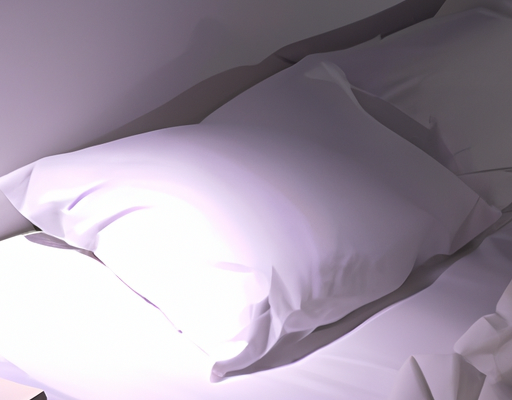“Sleep Better, Live Better: Unlock the Benefits of a Good Night’s Sleep!”
Introduction
Getting a good night’s sleep is essential for our physical and mental health. It helps us to stay alert and productive during the day, and it can also help us to maintain a healthy weight. A good night’s sleep can also reduce stress and improve our overall mood. In this article, we will discuss the various benefits of a good night’s sleep and how it can help us to lead healthier and happier lives.
How to Get a Good Night’s Sleep: Tips for Better Sleep
Getting a good night’s sleep is essential for physical and mental health. Unfortunately, many people struggle to get the quality sleep they need. Here are some tips to help you get a better night’s sleep.
1. Establish a consistent sleep schedule. Going to bed and waking up at the same time each day helps to regulate your body’s internal clock.
2. Avoid caffeine and alcohol. Caffeine and alcohol can interfere with your sleep cycle. Try to avoid them in the hours before bedtime.
3. Exercise regularly. Regular exercise can help you sleep better. However, avoid exercising too close to bedtime as it can make it harder to fall asleep.
4. Avoid screens before bed. The blue light from screens can interfere with your body’s production of melatonin, a hormone that helps you sleep. Try to avoid screens for at least an hour before bed.
5. Create a comfortable sleep environment. Make sure your bedroom is dark, quiet, and at a comfortable temperature.
6. Avoid naps during the day. Napping during the day can make it harder to fall asleep at night. If you need a nap, try to keep it short and before 3 pm.
7. Relax before bed. Try to relax before bed by taking a warm bath, reading a book, or listening to calming music.
By following these tips, you can get a better night’s sleep and improve your overall health and wellbeing.
The Science Behind Why a Good Night’s Sleep is Essential
Getting a good night’s sleep is essential for our physical and mental health. Sleep is a vital part of our daily routine, and it is important to understand the science behind why it is so important.
The body needs sleep to restore and repair itself. During sleep, the body produces hormones that help to regulate metabolism, growth, and development. Sleep also helps to strengthen the immune system, allowing us to fight off illnesses and infections.
Sleep also helps to improve cognitive function. During sleep, the brain processes and stores information, allowing us to remember and recall information more easily. Sleep also helps to improve concentration and focus, allowing us to perform better in school and work.
Sleep also helps to regulate our emotions. During sleep, the brain processes and regulates our emotions, allowing us to better manage stress and anxiety. Sleep also helps to reduce the risk of depression and other mental health issues.
Finally, sleep helps to regulate our circadian rhythm. Our circadian rhythm is an internal clock that helps to regulate our sleep-wake cycle. When we get enough sleep, our circadian rhythm is in balance, allowing us to feel more alert and energized during the day.
In conclusion, getting a good night’s sleep is essential for our physical and mental health. Sleep helps to restore and repair the body, improve cognitive function, regulate our emotions, and regulate our circadian rhythm. Therefore, it is important to make sure that we get enough sleep each night.
The Benefits of a Good Night’s Sleep for Mental and Physical Health
Getting a good night’s sleep is essential for both mental and physical health. Sleep is a vital part of our daily lives, and it is important to ensure that we get enough of it. A good night’s sleep can help to improve our mental and physical health in a number of ways.
Firstly, a good night’s sleep can help to improve our mental health. During sleep, our brains are able to process and store information, which can help to improve our memory and concentration. It can also help to reduce stress and anxiety, as well as improve our mood. A lack of sleep can lead to irritability, difficulty concentrating, and a lack of motivation.
Secondly, a good night’s sleep can help to improve our physical health. During sleep, our bodies are able to repair and regenerate cells, which can help to improve our overall physical health. It can also help to reduce the risk of certain diseases, such as heart disease and diabetes. A lack of sleep can lead to a weakened immune system, which can make us more susceptible to illness.
Finally, a good night’s sleep can help to improve our overall quality of life. When we are well-rested, we are more likely to be productive and have more energy throughout the day. We are also more likely to make healthier choices, such as eating a balanced diet and exercising regularly.
In conclusion, getting a good night’s sleep is essential for both mental and physical health. It can help to improve our memory and concentration, reduce stress and anxiety, and reduce the risk of certain diseases. It can also help to improve our overall quality of life by making us more productive and energetic. Therefore, it is important to ensure that we get enough sleep each night.
How to Create a Bedtime Routine for Better Sleep

Creating a bedtime routine is an important part of ensuring a good night’s sleep. A consistent bedtime routine helps to signal to the body that it is time to wind down and prepare for sleep. Here are some tips for creating a bedtime routine that will help you get the restful sleep you need.
1. Establish a consistent bedtime. Choose a time that works for you and stick to it. This will help your body get used to the routine and make it easier to fall asleep.
2. Avoid screens before bed. The blue light from screens can interfere with your body’s natural sleep cycle. Try to avoid using screens for at least an hour before bed.
3. Create a relaxing atmosphere. Dim the lights, light a candle, or use essential oils to create a calming atmosphere.
4. Do something calming. Take a warm bath, read a book, or practice some light stretching or yoga.
5. Avoid caffeine and alcohol. Caffeine and alcohol can interfere with your sleep cycle, so try to avoid them in the evening.
6. Write down your worries. If you find yourself worrying about the day’s events, take a few minutes to write them down. This can help to clear your mind and make it easier to fall asleep.
By following these tips, you can create a bedtime routine that will help you get the restful sleep you need.
The Impact of Sleep Deprivation on Your Health
Sleep deprivation is a serious health issue that can have a significant impact on both physical and mental health. It is defined as not getting enough sleep, or not getting enough quality sleep. Sleep deprivation can be caused by a variety of factors, including stress, lifestyle choices, and medical conditions.
The effects of sleep deprivation can be far-reaching and can have a significant impact on overall health. Physically, sleep deprivation can lead to an increased risk of obesity, diabetes, heart disease, and stroke. It can also lead to a weakened immune system, making it more difficult to fight off infections. Additionally, sleep deprivation can lead to fatigue, difficulty concentrating, and an increased risk of accidents.
Mentally, sleep deprivation can lead to an increased risk of depression, anxiety, and other mental health issues. It can also lead to difficulty making decisions, impaired memory, and difficulty controlling emotions.
In order to reduce the effects of sleep deprivation, it is important to practice good sleep hygiene. This includes avoiding caffeine and alcohol before bed, avoiding screens before bed, and creating a comfortable sleep environment. Additionally, it is important to establish a regular sleep schedule and to get enough quality sleep.
Sleep deprivation can have a serious impact on both physical and mental health. It is important to practice good sleep hygiene and to get enough quality sleep in order to reduce the effects of sleep deprivation.
How to Overcome Insomnia and Get a Good Night’s Sleep
Insomnia is a common sleep disorder that can have a significant impact on your quality of life. If you are struggling with insomnia, there are several steps you can take to help you get a good night’s sleep.
First, establish a regular sleep schedule. Going to bed and waking up at the same time each day helps to regulate your body’s internal clock and can help you fall asleep more easily. Avoid napping during the day, as this can disrupt your sleep cycle.
Second, create a comfortable sleep environment. Make sure your bedroom is dark, quiet, and at a comfortable temperature. Consider using blackout curtains or an eye mask to block out light, and use a white noise machine or earplugs to reduce noise.
Third, avoid stimulants such as caffeine, nicotine, and alcohol close to bedtime. These substances can interfere with your ability to fall asleep and stay asleep.
Fourth, exercise regularly. Regular physical activity can help you sleep better, but avoid exercising close to bedtime as this can make it harder to fall asleep.
Fifth, limit your exposure to screens before bed. The blue light emitted from screens can interfere with your body’s production of melatonin, a hormone that helps regulate your sleep-wake cycle.
Finally, if you are still struggling with insomnia, talk to your doctor. They may be able to recommend medications or other treatments that can help you get a good night’s sleep.
The Benefits of Napping During the Day for Better Sleep at Night
Napping during the day can be beneficial for improving sleep at night. While it may seem counterintuitive to take a nap during the day when the goal is to sleep better at night, research has shown that taking a nap can help improve overall sleep quality.
Napping during the day can help to reduce fatigue and improve alertness. This can be especially beneficial for those who have difficulty staying awake during the day due to a lack of sleep the night before. A short nap can help to restore energy levels and improve focus and concentration.
Napping during the day can also help to improve mood. Studies have shown that taking a nap can help to reduce stress and anxiety, as well as improve overall mood. This can be beneficial for those who are feeling overwhelmed or anxious due to lack of sleep.
Napping during the day can also help to improve cognitive performance. Studies have shown that taking a nap can help to improve memory and learning, as well as increase creativity. This can be beneficial for those who need to stay sharp and focused during the day.
Finally, napping during the day can help to improve sleep at night. Studies have shown that taking a nap during the day can help to reduce the amount of time it takes to fall asleep at night, as well as improve overall sleep quality. This can be beneficial for those who are having difficulty sleeping at night due to fatigue or stress.
In conclusion, napping during the day can be beneficial for improving sleep at night. Taking a short nap during the day can help to reduce fatigue and improve alertness, as well as improve mood and cognitive performance. Finally, napping during the day can help to improve sleep at night by reducing the amount of time it takes to fall asleep and improving overall sleep quality.
Conclusion
A good night’s sleep is essential for physical and mental health. It helps to improve concentration, memory, and overall cognitive performance. It also helps to reduce stress, improve mood, and boost the immune system. In addition, it can help to reduce the risk of certain diseases, such as heart disease, diabetes, and obesity. Therefore, getting a good night’s sleep is an important part of maintaining a healthy lifestyle.












